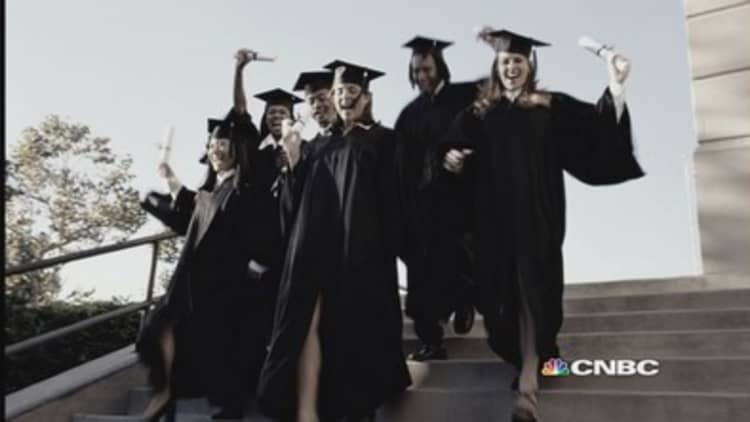U.S. citizens of Asian descent have made sizable gains in income and wealth in the past 25 years—so much so that they are on pace to eclipse whites as the wealthiest group of Americans, according to new data from the Federal Reserve.
In a recent study, the St. Louis Fed broke down income gains among ethnic groups and found that white families ranked first in inflation-adjusted dollars.
However, Asian-American wealth had "changed dramatically" since 1989, the bank said, with the demographic's middle-income group already overtaking that of Caucasians. That is due, in large measure, to what it calls "the remarkable increase in educational attainment by younger Asians in recent decades."
According to Bill Emmons, an economist at the St. Louis Fed, Asian-Americans may in fact become the wealthiest ethnic group in the U.S. within the next few decades.
"I would be surprised if Asian wealth didn't surpass in the next 25 years," he said.
According to the St. Louis Fed's study, Asian-American median wealth in 2013 stood at $91,440, about 70 percent of the level of whites. Their wealth increased 43 percent since 1989 (inflation adjusted), Emmons and his co-authors at the Fed found. Whites gained only 3 percent to $134,008 in that same time period.
Read MoreRiding the K-wave, these Korean stocks are set to soar
However, the wealth story in America reveals a deepening racial divide. There's a whopping 90 percent gap between the median wealth of Hispanics and blacks compared to whites, according to the bank's data. The median wealth of Hispanic families increased 51 percent from 1989 to $13,900 in 2013, while that of blacks gained 45 percent to reach $11,184.
What came first: Wealth or education?
A predictable variable in Asian wealth is education, the authors wrote, yet it's not the only factor in the equation, nor is it entirely linear. The gains among Asians as a group raise the question of whether education contributed to their wealth, or whether wealth enabled them to attain more education.
The Fed's Emmons feels it's the latter.
"The more wealthy you are, the more you can afford to invest in education," Emmons said.
In 2013, 73 percent of Asians aged 35-39 held a degree beyond high school. That percentage was 54 percent for whites, 36 percent for blacks and 23 percent for Hispanics. The disparity grows when looking at individuals with at least a four-year college degree: 65 percent (Asian), 42 percent (white), 26 percent (black) and 16 percent (Hispanic).
Read Moremillennials are shaking North Korea's regime
The implications of this academic disparity are far-reaching, and constitute a cycle of sorts. The education gap is driving the wealth accumulation gap, which in turn is driving the education gap.
"The financially literate could become wealthy through their acumen. Or having more wealth could teach you about financial knowledge," said Rakesh Kocchar, associate director of research at the Pew Research Center's Hispanic Trends Project. He added that wealth is also be driven by what the individual is exposed to in their economic life.
"If you never had to make major financial choices ... say someone with low educational attainment, working as a busboy, you were never offered a 401(k) and you're dependent on government programs, then you never had the opportunity to learn how to manage money effectively," Kocchar said.
The wealth effect

When Emmons narrowed the data set to only examine Asians younger than 62, both levels of median wealth and median income surpassed those of whites.
This implies that "younger Asians tend to be financially stronger than older Asians," Emmons said. "And older Asians compared to their white counterparts, are weaker financially."
The wealth gap between older and younger Asians is an anomaly, said Haskin. Wealth normally functions the other way around—the older population have higher levels of wealth, for various reasons. Among Asians, however, it is the younger population who are wealthier.
Read MoreMore millionaires than ever are living in the US
Younger Asians are likely to be the children of immigrants or young immigrants themselves, Haskin said: "Many groups of Asians like the Vietnamese and Hmong—they started with very, very little and left almost everything in the home country."
In addition to the ability to save, wealth accumulation may be correlated with incentives to save. The wealthy have higher incentives to learn about the financial system and accumulate wealth because they need to shift income now to retirement, Emmons said.
Those in lower-income brackets may not have the same incentives because they have more support from government retirement programs. Additionally, most rarely see a peak or large increase in earnings that allow them to save more.
Read MoreAsia's Netflix aims to shake up startup world
"They're treated better by Social Security and Medicare. So they don't have as much incentive nor the ability to save a lot. That's another reason the wealth gap is so large and will keep getting large," Emmons said.
Ron Haskin, co-director at the Brookings Institute Center on Children and Families, said he was skeptical that wealth disparity was due to incentives. Rather, it's about habit.
"Wealthy people are used to a certain standard of living, with separate values. They're used to saving just to save," he said.
"They save not just for retirement but also just to have in the bank, for emergencies, for the kids, or they want to buy a new house and boat. Saving becomes a pattern in their life," Haskin added.


